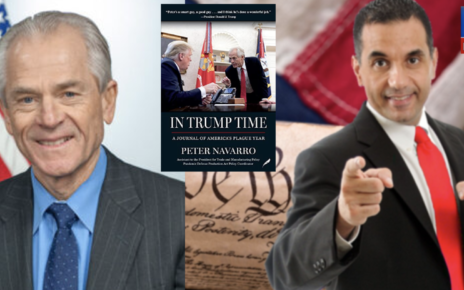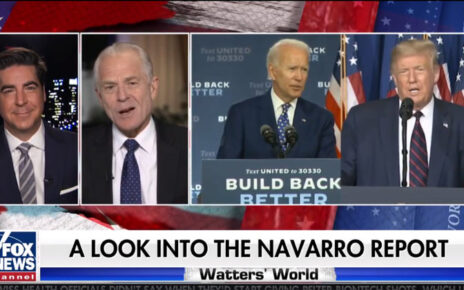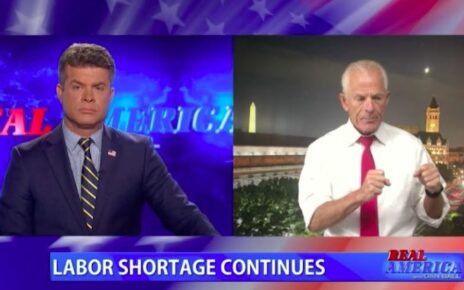Peter Navarro on new tariffs, NAFTA talks and China trade | Fox News Video
White House director of trade policy responds to G7 finance chiefs condemning new tariffs targeting U.S. allies.
G7 finance chiefs condemning new tariffs targeting US allies
June 3, 2018 – FNC, Sunday Morning Futures
PETER NAVARRO, DIRECTOR OF TRADE POLICY, WHITE HOUSE: Good morning, Maria.
BARTIROMO: So what’s your reaction to what we’ve heard this morning and this weekend from Canada, France, Germany, the UK, Italy, and Japan who all collectively issued a joint statement excluding the U.S. conveying their unanimous concern and disappointment on these tariffs, are you expecting dollar-for-dollar retaliation?
NAVARRO: I’m not worried about reaction. What we have here is President Donald J Trump taking an action that he promised on the campaign trail back in June of 2016 to defend our aluminum and steel industries from going out of business and extinction. As the president has said we need aluminum steel industries if we’re going to have a country. And the problem we have Maria is that we got 20 countries including all of those countries you mentioned flooding our markets with steel, putting 50,000 steelworkers out of business in the last decade.
We have 15 countries flooding our markets with aluminum driving that industry to near distinction, and all we’re doing here, all we’re doing here, all the president is doing is defending this country’s national security sovereignty and economic security from those flood of imports. What we expect is our allies, friends, partners to understand two things. One, that we have the right to do that in the interest of national security. And two, they need to look in the mirror at their own unfair trade practices. For example, Europe, if we try to sell a car over there, Europe charges us a high VAT tax and a 10 percent tariff. They want to sell it here, it’s — we give them a 2.5 percent tariff. That’s not fair.
Canada just can’t — just kicks us, kicks us, kicks us on lumber and puts people out of work in Maine. They kick us on dairy, puts people out of work in Wisconsin. So these are our friends, they’re our allies, they’re – – we engaged strategically with them, but at the end of the day this is a trade dispute and the President is going to defend this country. He stands for American workers and he’s standing up for them now. Those American workers are also wondering why they’re seeing joblessness, why they’re seeing an impact to the very states that voted for Donald Trump for this last election. Are you worried that the very areas that this president is targeting aluminum and steel are going to be the states that actually see higher prices and perhaps job losses?
NAVARRO: So in light of Friday’s jobs report which the New York Times apparently ran out of superlatives describing it’s — the height of spin to suggest it could be any unemployment. Look, there’s been seven times, seven times since 1970, since the unemployment rate has been reported under four percent and the last two quarters was for this presidency. We have a disproportionate amount of the new jobs being created in manufacturing. We have investment off-the-charts. This economy is so strong that nobody should be worried about any of the spin that anybody’s saying.
This is a story that’s truly remarkable and Donald J. Trump has brought in tax cuts deregulation and trade policies that are working for the American working people. And guess what, on Friday they opened a $1.5 billion groundbreaking aluminum rolling mill in Ashland, Kentucky. Why is that important? It’s the heart of Appalachia, and Appalachia is the heart of poverty in America. And guess what, the starting salary at that plant is going to be$65,000 in a community where the average median household income is $44,000 well below the national average.
BARTIROMO: All very good —
NAVARRO: No president, no president has fought the war in poverty better than Donald J. Trump. African-American employment and Hispanic employment is at record lows. So all this idea about people worried about losing their jobs, not going to happen in the Trump economy.
BARTIROMO: Well, because we haven’t seen the impact of these tariffs yet. That’s the — precisely why I bring up this point. I mean, I recognize what the president and the administration has done in terms of triggering economic growth, animal spirits once again. The Atlanta Federal Reserve just said that we’re looking at 4.7 percent growth for the second quarter so things are good. But the point is once you actually see these higher tariffs and these countries, our allies by the way, fight back and raise their tariffs, that’s only going to increase prices is it not? It’s going to force producers to actually increase their prices and ultimately fall on the consumer. So how much of a threat are these taxes going to have in terms of cutting into economic growth and the very strong growth that we’ve seen?
NAVARRO: So I guess — I guess my point here would be that we’ve already seen the impacts of the tariffs. Remember, we imposed tariffs on solar panels and dishwashers many months ago. Donald J. Trump had the courage and vision to do that. We haven’t seen any of these dire consequences you mentioned. All we’ve seen is additional new investment in two industries which are critical in terms of creating well-paying jobs for working men and women in this country. So what I would say to the American people is they listen to this spin.
They have to understand that the spin out there amongst the intelligencia and the elites is that we should keep doing what we’ve been doing for the last 15 years. And as Donald J. Trump said in a tweet yesterday, we lose close to 800 billion a year and the trade war we lost that long ago because the failure of the courage in leadership of people like Barack Obama, George Bush, and Bill Clinton who by the way got us into both NAFTA and China into the WTO which are the two worst deals in American history. So what we’re doing — the president he’s just — he just amazing when he looks at the chessboard. I mean, every single economic indicator, consumer confidence up, business confidence up.
BARTIROMO: Right.
NAVARRO: Fixed investment double what it was —
BARTIROMO: But we’re looking ahead — we’re looking ahead and trying to understand what the impact is. I want to get to China so give me a moment though. But first on Canada, before we move on to China. Canada has already said, Justin Trudeau came out said we are going to match dollar for dollar. Is this more about NAFTA or is this the same issue as the other countries? Because you’re making a national security issue here, where’s the national security with Canada?
NAVARRO: So the national security issue is not about Canada or China or Turkey or any other country that sends us aluminum or steal. The national security issue is a flood of imports from 20 countries that are putting our aluminum steel businesses out of business. And so the national security issue is basically us looking outward defending ourselves against that flood of imports so that these industries can thrive. And guess what, the day those tariffs were announced, Granite City, Illinois this U.S. steel had announced that plant would be reopened, Hawesville, Kentucky, there was a plant that day Century Aluminum, $150 million worth of new investment in modernization, so all of this is working.
This is not aimed at any of the countries that those tariffs are put upon. They’re not aimed at those. They’re simply defending our industries and we just have to keep making that point and keep working with our allies. Now in the NAFTA thing, Maria, it’s very important. There’s no connection at all, none whatsoever between the actions taken on the tariffs and the NAFTA negotiations. They are two separate matters. The NAFTA negotiations have been going on for many months now and they’re continuing. There’s hundreds of people on all sides that sit around tables trying to work that out.
BARTIROMO: So, if there is a new NAFTA deal, will the President remove these tariffs from Mexico and Canada then?
NAVARRO: These are two separate unrelated events and should be treated as such.
BARTIROMO: So no, the answer is no.
NAVARRO: They’re two unrelated events. And guess what, there’s only two things that are going to happen with the NAFTA renegotiations. Either we’re going to get a deal for the American people that basically reduces the trade deficit with Mexico and then allows us to build more fair factories here or we’re going to leave NAFTA. The option of staying in the status quo won’t hold. And that’s the problem. The status quo on trade whether it’s with China, with NAFTA, with the Europeans, it just isn’t working for the American people. They beat us because they don’t play fair. They have higher tariffs than we do, higher non-tariff barriers, and this President, it takes courage and vision to stand up to the swamp, trust me on that.
BARTIROMO: Well, it takes — it takes courage to stand up to China I get that. I want to ask you about China because here’s the headline of the morning in terms of China. I’m reading an article right now and it says China says all trade progress is off if the U.S. imposes these tariffs. Are we willing to throw away the relationship that we have with China to push tariffs and restrictions on the country?
NAVARRO: Well, let’s look at the relationship we have with China. We have a $371 billion trade deficit in good which basically ships off two million manufacturing jobs to China every year. That’s not so good. We had General Mattis talking about the activity in the South China Sea with respect to China building up all their island, there artificial islands and of course, the big issue that we’re fighting — the president’s fighting with Ambassador Lighthizer is this theft of our crown jewels of technology. They take our technology, Maria. Everybody knows they steal it. But they also force the transfer of it, they evade our export controls, and they’re coming over here. The Chinese state-owned enterprises coming over here with bags full of money and buying up places like Silicon Valley. So that’s a relationship with China that structurally needs to change. We’d love to have a peaceful and friendly relationship with China but we also are standing firm on the idea and the President is the leader on this and he’s known this for decades.
BARTIROMO: How far are you willing to go? How far are you willing to go, Peter? China wants to take its companies public on the floor of the New York Stock Exchange. Are you going to push back if they don’t stop stealing and say you can’t even take your companies public in New York?
NAVARRO: See, I’m not the right person to ask on that. Donald J. Trump is the president. I’m part of a large trade team that interacts with all of the agencies. We sit in places like the Situation Room and talk about how this is going to go.
BARTIROMO: Right, understand. I understand but you’re trying to stop China from stealing intellectual property. Peter, they don’t even admit it. They say they don’t do it. So how do you change a situation where you can’t even get them to agree that they are in fact stealing I.P.
NAVARRO: Well we have a — in motion the president has said that come June 15th they’ll be targeted tariffs so on the China 2025 high-tech industries of the future that they tried to take from us and they’ll be set investment restrictions on June 30th to prevent them from coming in and buying companies that are in things like artificial intelligence and robotics which by the way are not only the industries of our economic future but they’re also the industries that are very important militarily.
BARTIROMO: I get that —
NAVARRO: So the president is taking measured, thoughtful, strategic steps. He’s — this started again back in June of 2016 where he said in Pittsburgh that he would crack down on Chinese theft in intellectual property. He’s just doing what he said he’s going to do. Its promises made, promises kept and this president is amazing. Just look at the numbers.
BARTIROMO: Peter, it’s good to have you on the program. Thanks so much.
NAVARRO: Thank you, Maria.



